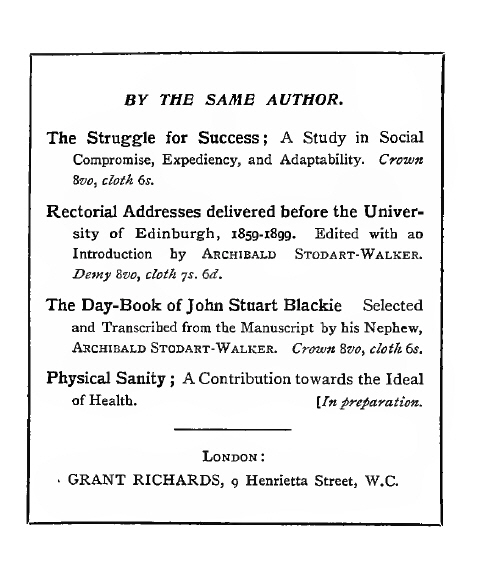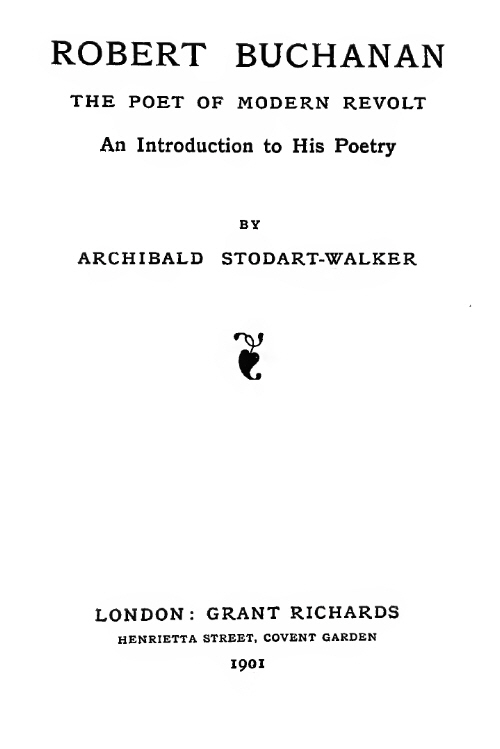|
iii
ROBERT BUCHANAN
THE POET OF MODERN REVOLT
An Introduction to His Poetry
BY
ARCHIBALD STODART-WALKER
LONDON: GRANT RICHARDS
HENRIETTA STREET, COVENT GARDEN
1901
iv
Edinburgh: T. and A. CONSTABLE, (late) Printers to Her Majesty
v
TO
M. T. K.
IN MEMORY OF READINGS FROM
THE POET AND OTHER ASSOCIA-
TIONS OF FRIENDSHIP
vii
PREFACE
This book neither presumes to be of the nature of a criticism, nor of an estimation. It was conceived with the view of indicating the significance of Robert Buchanan as a poet, in the sense of the poet defined as an impassioned philosopher. There will be found nothing of the nature of comparative analysis.
The method pursued by the writer will soon be evident to the most casual reader. After a general introduction, in which a general glimpse is taken of the poet’s point of view, the various poems are brought into consideration and displayed in a panoramic fashion. In following this plan, the author obtrudes his subjectivity as little as possible, but allows the poet to speak for himself and suggest his own significance and teaching. Occasionally, as in the chapter on the Devil, it has been found expedient to review in a cursory way the historical and literary parallels concerned, and in the viii introductory and concluding chapters an attempt is made to view, in general fashion, the significance of Mr. Buchanan in the stress of contemporary mental and spiritual searchings, and in face of the tendencies of modern economics.
The author has no concern in this place with Mr. Buchanan as a man, as a publicist, as a novelist and story-teller, or as a dramatist. He believes that in viewing him as a poet, he is concerned with the Buchanan that is of importance in contemporary literary aspirations; but even in so doing, he is not bold enough, in attempting this study of his significance, to go out of his way to allot to his work any definite valuation. In his humble opinion, that cannot be done, even by the most self-confident and self-righteous of critics. Time will not vary its claim in this case to have the chief say in the matter.
It may be of interest to the reader to know that this book is written by one who has sought far different solutions for most of the problems of life, from those that have appealed to the poet. But even a scientific man can view with sympathy one who seriously aspires to reach Truth, in a fashion and in a medium foreign to his own particular methods and teaching. Though the ix mystic realism of the poet be anathema to the point of view of the scientific purist, yet the latter may allow himself to be carried from the solid ground of Nature, to which the mind which builds for aye must for ever trust, to the more shadowy land where the dreamer loves to dwell, and see mirrored in the eyes of the poet the vista of newer worlds and newer hopes, without in any way blurring the face of his philosophy.
In conclusion, the author desires to express indebtedness to his friend Mr. James Cadenhead for looking over the final proofs.
30 Walker Street,
Edinburgh.
_____
CONTENTS
|

